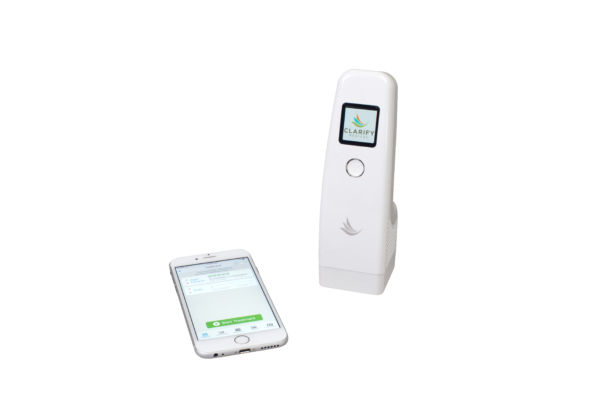
Clarify Home Light Therapy System is a Narrow Band UVB phototherapy treatment for a variety of skin conditions including psoriasis
A San Diego-based medical-device maker has landed a Series A investment of $18 million that will help to further commercialize its connected, handheld phototherapy device that is FDA-approved for patients with psoriasis and other skin conditions.
The device from Clarify Medical has been available for two years. Since January, it has been covered by Medicare for patients with psoriasis, said George Mahaffey president and CEO of Clarify Medical. Tricare, the health insurance program for active military members and their families, began covering the device on Oct. 25.
The next steps include securing coverage by other private insurers.
“Each one has its own type of process.,”Mahaffey said. “We are involved with nearly 50 private payers at different stages.”
The latest funding will support that effort, as well as additional hiring. The company has six employees and expects to hire 12 to 18 more over the next year.
Investors in the Series A round include H.I.G. BioHealth Partners, 7wire Ventures, SV Health Investors and Bluestem Capital. Clarify Medical raised an additional $3.6 million in bridge notes. It had raised $10.6 million in previous rounds, according to Teddy Fulham, vice president of finance and business development for Clarify Medical, which was founded in 2014 as Skylit Medical. The name changed in 2016.
The list price for the device, known as the Clarify Home Light Therapy System, is $1,495, Mahaffey said. Medicare reimbursement is $1,034.
Clarify Medical is not the first company to make a device for delivering phototherapy at home, which involves periodically bathing affected skin areas in specific types of light known as narrowband ultraviolet B. Existing players include National Biological Corp., based in Beachwood, Ohio.
Phototherapy booths also are available in about 11 percent of dermatology offices in the U.S., said Mahaffey. But it often is hard for patients to adhere to the prescribed in-office treatment, as it involves doses three times a week for months in a row.
“It works. but what human being can come in three times a week for weeks to a clinic?” Mahaffey said.
Clarify Medical aims to make adherence easier with its in-home device. Its phototherapy device is paired via Bluetooth with a smartphone app that controls the dosage, pushes out reminders to patients and collects data about their adherence to phototherapy treatment.
“We know in real-time what all of our patients are doing,” Mahaffey said.
Clarify Medical also employs care partners who can answer questions from patients and resolve technical concerns, such as switching the phototherapy device to a new phone, Mahaffey said. The approach frees up dermatologists from having to manage the phototherapy process, he added.
And because patients must engage with the app to use the device, the company could begin to incorporate coaching, nutrition, wellness and other healthcare messages for its users. That potential is what appealed to at least one of Clarify Medical’s new investors, 7wire Ventures. People with psoriasis and other skin conditions often have other chronic issues.
“We see an opportunity here to leverage the treatment solution to help people manage these chronic conditions, which are expensive and painful,” said Robert Garber, a partner at 7wire who has joined the board of Clarify Medical. Other new board members include Michael Wasserman, managing director of H.I.G. BioHealth, and Paul LaViolette, managing partner and COO of SV Health.
About 30 million Americans suffer from psoriasis, eczema or vitiligo, which causes white patches to appear on a person’s skin. Insurers typically cover treatments for psoriasis, often cover them for eczema but rarely for vitiligo, which is considered more of a cosmetic problem, Mahaffey added.
For psoriasis, Clarify Medical’s device is best for patients with mild to moderate cases, covering 4 percent or less of their body surface, Mahaffey said, noting that such patients represent about 85 percent of the market. Patients with coverage of 10 percent or more are better served with larger phototherapy devices or with pharmaceuticals. But the latter can cost tens of thousands of dollars a year.
National Biological makes devices in a range of sizes, including some that are handheld, said Haley White, the company’s chief commercial officer.
“But our most popular products are for patients with full-body psoriasis,” she said, adding those devices are about six feet tall.
National Biological’s devices are not connected. They rely instead on pre-set counters that do not allow patents to use the device more than what has been prescribed by their dermatologists, White said. If patients need additional treatments, they are sent a code that unlocks a new round of phototherapy.
White declined to say if National Biologic is working to develop connected devices. But another observer said that is the goal of many device makers today.
“There’s kind of a land grab going on in connected healthcare,” said Warren Goldenberg, a Cleveland-based attorney and entrepreneur. He is COO of KeborMed Inc., a company developing a software platform for connected devices.
Companies that are first on the scene are likely to gain significant market share, Goldenberg sid. He was involved nearly a decade ago in a phototherapy startup called Fluence Therapeutics. It closed due to lack of funding, he said.
At-home light therapy for psoriasis is not a new idea, he said. “But syncing it with a smartphone, I think, is something that at least I haven’t heard of before.”










